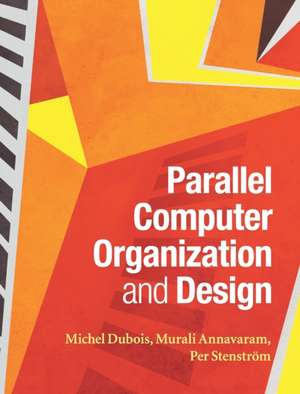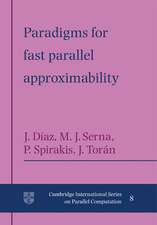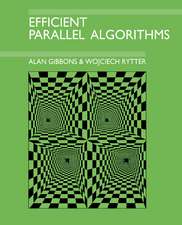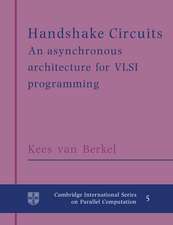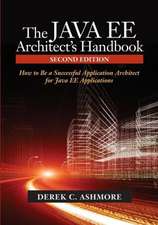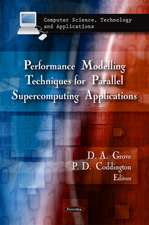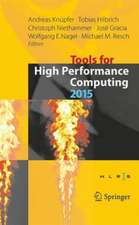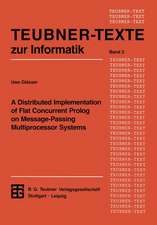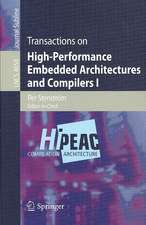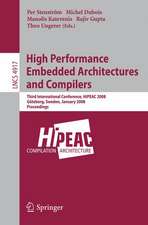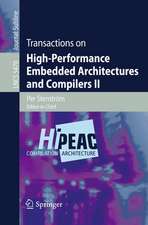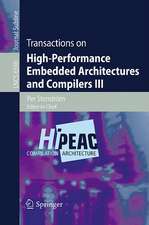Parallel Computer Organization and Design
Autor Michel Dubois, Murali Annavaram, Per Stenströmen Limba Engleză Hardback – 29 aug 2012
Preț: 565.11 lei
Preț vechi: 706.39 lei
-20% Nou
108.14€ • 115.63$ • 90.16£
Carte tipărită la comandă
Livrare economică 18 aprilie-02 mai
Specificații
ISBN-10: 0521886759
Pagini: 562
Ilustrații: 206 b/w illus. 49 tables 95 exercises
Dimensiuni: 192 x 252 x 29 mm
Greutate: 1.32 kg
Ediția:New.
Editura: Cambridge University Press
Colecția Cambridge University Press
Locul publicării:Cambridge, United Kingdom
Cuprins
1. Introduction; 2. Impact of technology; 3. Processor microarchitecture; 4. Memory hierarchies; 5. Multiprocessor systems; 6. Interconnection networks; 7. Coherence, synchronization, and memory consistency; 8. Chip multiprocessors; 9. Quantitative evaluations.
Recenzii
'… an excellent textbook which can serve both as an introduction to multi-core and parallel architectures, as well as a reference for engineers and researchers.' Olivier Temam, INRIA, France
'… fills an urgent need for a comprehensive and authoritative yet approachable tutorial and reference text for advanced computer architecture topics. All of the key principles and concepts covered in Wisconsin's three-course computer architecture sequence are addressed in a well-organized, thoughtful, and pedagogically appealing manner, without overwhelming the reader with distracting trivia or an excess of quantitative data … the final chapter on quantitative evaluation - a true gem! - is a unique and valuable asset that will clearly set this book apart from its competition.' Mikko Lipasti, University of Wisconsin, Madison
'Its content is rich, coherent and clear. Its questions are crafted to stimulate creative thinking. I recommend the book as a must read to all graduate students and young researchers and engineers designing computers.' Lixin Zhang, Institute of Computing Technology, Chinese Academy of Sciences
'This is a perfect text for a one semester graduate course.' Lawrence Rauchwerger, Texas A&M University
'It is the best of today's books on the subject, and I plan to use it in my class. It is an up-to-date picture of parallel computing that is written in a style that is clear and accessible.' Trevor Mudge, University of Michigan
'I want to particularly stress the uniquely clear way in which the authors explain the hardest among these topics: coherence, synchronization, and memory consistency.' Manolis Katevenis, University of Crete and Head of the Computer Architecture and VLSI Systems Laboratory, FORTH-ICS
Descriere
Teaching fundamental design concepts and the challenges of emerging technology, this textbook prepares students for a career designing the computer systems of the future. In-depth coverage of complexity, power, reliability and performance, coupled with treatment of parallelism at all levels, including ILP and TLP, provides the state-of-the-art training that students need. The whole gamut of parallel architecture design options is explained, from core microarchitecture to chip multiprocessors to large-scale multiprocessor systems. All the chapters are self-contained, yet concise enough that the material can be taught in a single semester, making it perfect for use in senior undergraduate and graduate computer architecture courses. The book is also teeming with practical examples to aid the learning process, showing concrete applications of definitions. With simple models and codes used throughout, all material is made open to a broad range of computer engineering/science students with only a basic knowledge of hardware and software.
